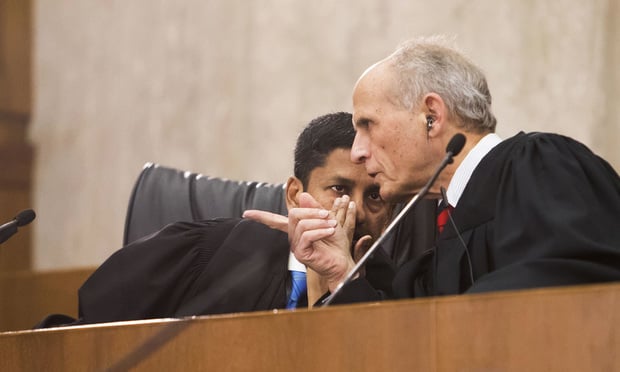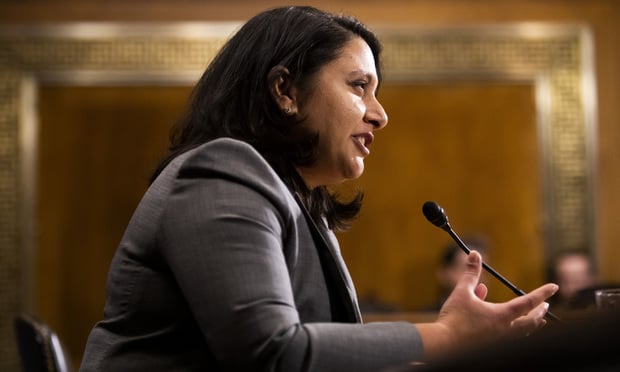Trump's Lawyer Faced Skeptical DC Circuit Panel in Subpoena Fight
The panel—Judges Patricia Millett, David Tatel and Neomi Rao—spent more than two hours grilling the House's top lawyer and a private attorney representing Trump. The court appeared, at times, divided.
July 12, 2019 at 12:13 PM
6 minute read
 D.C. Circuit Judges David Tatel, right, and Sri Srinivasan, left, confer. (Photo: Diego M. Radzinschi)
D.C. Circuit Judges David Tatel, right, and Sri Srinivasan, left, confer. (Photo: Diego M. Radzinschi)
A federal appeals court weighing President Donald Trump's push to block a U.S. House committee subpoena for financial records from his accounting firm appeared divided Friday over arguments that lawmakers had acted outside the scope of their authority.
Judges Patricia Millett, David Tatel and Neomi Rao of the U.S. Court of Appeals for the D.C. Circuit heard arguments for more than two hours in the court's ceremonial courtroom, where marble statues of Hammurabi, Moses, Solon and Justinian are built into the wall behind the judges' bench.
Millett and Tatel, both appointed by Democratic presidents, expressed skepticism at times over Trump's claim that House lawmakers were out of bounds and lacked certain oversight authority, whereas Rao, who joined the bench in May, raised questions that suggest she might have concerns about the lawfulness of the subpoena.
Tatel pushed back against Trump lawyer William Consovoy's argument that House procedural rules did not permit the subpoena seeking documents from the accounting firm Mazars USA. “Mr. Consovoy, the only question before us is this subpoena,” Tatel said at one point.
“This is just financial disclosure, which presidents for years have been doing,” Tatel told Consovoy. “This subpoena seeks documents regarding the president's financial disclosures.”
During another exchange, Millett, a former Akin Gump Strauss Hauer & Feld partner, questioned how the court would be able to test whether House committee members were “genuine” in their assertion that they need the Trump records as part of an effort to craft legislation. Consovoy, of the Washington boutique Consovoy McCarthy, has challenged the committee's statement that it has a legislative purpose in pursuing Trump's financial records.
In May, U.S. District Judge Amit Mehta in Washington issued a ruling that backed the House subpoena. “To be sure, there are limits on Congress's investigative authority,” Mehta said in his ruling, “[b]ut those limits do not substantially constrain Congress. So long as Congress investigates on a subject matter on which 'legislation could be had,' Congress acts as contemplated by Article I of the Constitution.”
Douglas Letter, the House general counsel, on Friday urged the D.C. Circuit to uphold Mehta's decision, which he called “extremely strong.” Letter said any legislation Congress might pass after receiving the Trump accounting records from Mazars would not inherently intrude on the separation of powers between lawmakers and the office of the president.
The House subpoena, Letter argued, “would have very little impact, if at all, on how the president carries out his functions.”
Rao pressed Letter, without success, to provide historical examples where the House had passed a resolution or full vote permitting a committee to pursue a subpoena targeting a president.
“Would you say this is unprecedented, then?” Rao asked during one exchange, suggesting that the subpoena raises constitutional concerns. Letter said the House largely operates now by committees and noted that the subpoena targets Mazars, not the president. “He put himself in this position—and we can't forget that,” Letter argued, noting Trump's refusal to divest interests in various business entities before he was sworn in as president.
 Neomi Rao testifies before the Senate Judiciary Committee. Credit: Diego M. Radzinschi / NLJ
Neomi Rao testifies before the Senate Judiciary Committee. Credit: Diego M. Radzinschi / NLJMazars, represented by lawyers from the law firm Blank Rome, has not taken a public position on the House subpoena.
Friday's arguments came as Trump and his business entities face mounting pressure from House Democrats, who are pursuing other subpoenas and court cases that could expose financial records the president has long fought to shield from scrutiny. The D.C. Circuit's ruling will almost assuredly reach the U.S. Supreme Court, perhaps even before the start of the new term in October.
The appeals court is expected soon to decide whether congressional Democrats can proceed with a suit that claims Trump violated the Constitution's restrictions against presidents accepting gifts and money from foreign and domestic sources. Another appeals court ruled this week in Trump's favor in a related suit. The Richmond-based Fourth Circuit said the complaint, filed by the attorneys general for Maryland the District of Columbia, should be dismissed.
Separately, a new case in Washington's federal trial court seeks several years' worth of Trump's tax returns. Justice Department lawyers have defied statutory language that requires the IRS to furnish private tax returns on request by the House Ways and Means Committee. The House's suit, seeking to enforce a subpoena, is pending before U.S. District Judge Trevor McFadden.
Next month, the U.S. Court of Appeals for the Second Circuit will hear a subpoena challenge confronting other Trump business records. In that litigation, House committees are seeking financial records from Capital One and Deutsche Bank, which has long had a business relationship with the New York real estate tycoon and whose lending practices are more broadly facing scrutiny.
Deutsche Bank and Capital One, like Mazars, have not taken a public position on the subpoena. Lawyers from Akin Gump represent Deutsche Bank, and Murphy & McGonigle represents Capital One.
Read more:
Who Is Trevor McFadden? Meet the Judge Assigned the Trump Tax Returns Case
Trump Wants DC Circuit to Stop 'Distracting' Emoluments Suit
READ: US House Asks Judge to Force Disclosure of Trump's Taxes
US Appeals Court Orders Dismissal of 'Emoluments' Claims Against Trump
Trump's Lawyers Drag Justices Into DC Circuit Subpoena Fight
Judge Amit Mehta Backs House Subpoena for Trump Financial Records
This content has been archived. It is available through our partners, LexisNexis® and Bloomberg Law.
To view this content, please continue to their sites.
Not a Lexis Subscriber?
Subscribe Now
Not a Bloomberg Law Subscriber?
Subscribe Now
NOT FOR REPRINT
© 2025 ALM Global, LLC, All Rights Reserved. Request academic re-use from www.copyright.com. All other uses, submit a request to [email protected]. For more information visit Asset & Logo Licensing.
You Might Like
View All
Bankruptcy Filings Surged in First Half of 2024 Amid Uptick in Big Chapter 11 Cases
3 minute read
Trump Financial Statements From 2011 to 2020 'Should No Longer Be Relied Upon,' Accountant's GC Says

Bonuses and Beyond: Law Firms Wrap Up Lucrative Year With Record-High Rewards

Trending Stories
Who Got The Work
J. Brugh Lower of Gibbons has entered an appearance for industrial equipment supplier Devco Corporation in a pending trademark infringement lawsuit. The suit, accusing the defendant of selling knock-off Graco products, was filed Dec. 18 in New Jersey District Court by Rivkin Radler on behalf of Graco Inc. and Graco Minnesota. The case, assigned to U.S. District Judge Zahid N. Quraishi, is 3:24-cv-11294, Graco Inc. et al v. Devco Corporation.
Who Got The Work
Rebecca Maller-Stein and Kent A. Yalowitz of Arnold & Porter Kaye Scholer have entered their appearances for Hanaco Venture Capital and its executives, Lior Prosor and David Frankel, in a pending securities lawsuit. The action, filed on Dec. 24 in New York Southern District Court by Zell, Aron & Co. on behalf of Goldeneye Advisors, accuses the defendants of negligently and fraudulently managing the plaintiff's $1 million investment. The case, assigned to U.S. District Judge Vernon S. Broderick, is 1:24-cv-09918, Goldeneye Advisors, LLC v. Hanaco Venture Capital, Ltd. et al.
Who Got The Work
Attorneys from A&O Shearman has stepped in as defense counsel for Toronto-Dominion Bank and other defendants in a pending securities class action. The suit, filed Dec. 11 in New York Southern District Court by Bleichmar Fonti & Auld, accuses the defendants of concealing the bank's 'pervasive' deficiencies in regards to its compliance with the Bank Secrecy Act and the quality of its anti-money laundering controls. The case, assigned to U.S. District Judge Arun Subramanian, is 1:24-cv-09445, Gonzalez v. The Toronto-Dominion Bank et al.
Who Got The Work
Crown Castle International, a Pennsylvania company providing shared communications infrastructure, has turned to Luke D. Wolf of Gordon Rees Scully Mansukhani to fend off a pending breach-of-contract lawsuit. The court action, filed Nov. 25 in Michigan Eastern District Court by Hooper Hathaway PC on behalf of The Town Residences LLC, accuses Crown Castle of failing to transfer approximately $30,000 in utility payments from T-Mobile in breach of a roof-top lease and assignment agreement. The case, assigned to U.S. District Judge Susan K. Declercq, is 2:24-cv-13131, The Town Residences LLC v. T-Mobile US, Inc. et al.
Who Got The Work
Wilfred P. Coronato and Daniel M. Schwartz of McCarter & English have stepped in as defense counsel to Electrolux Home Products Inc. in a pending product liability lawsuit. The court action, filed Nov. 26 in New York Eastern District Court by Poulos Lopiccolo PC and Nagel Rice LLP on behalf of David Stern, alleges that the defendant's refrigerators’ drawers and shelving repeatedly break and fall apart within months after purchase. The case, assigned to U.S. District Judge Joan M. Azrack, is 2:24-cv-08204, Stern v. Electrolux Home Products, Inc.
Featured Firms
Law Offices of Gary Martin Hays & Associates, P.C.
(470) 294-1674
Law Offices of Mark E. Salomone
(857) 444-6468
Smith & Hassler
(713) 739-1250








